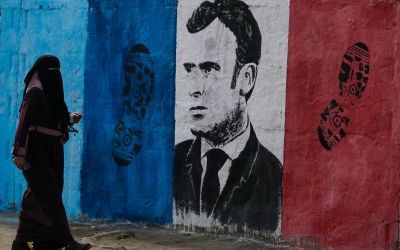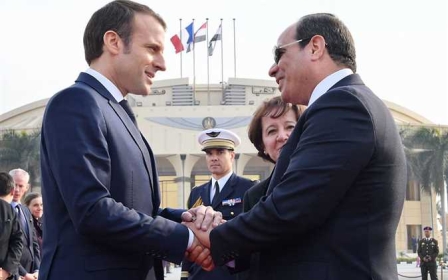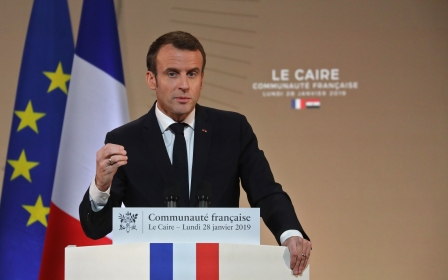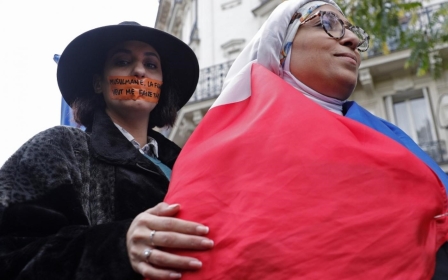France's weapons sales to Egypt won't be conditioned on human rights: Macron
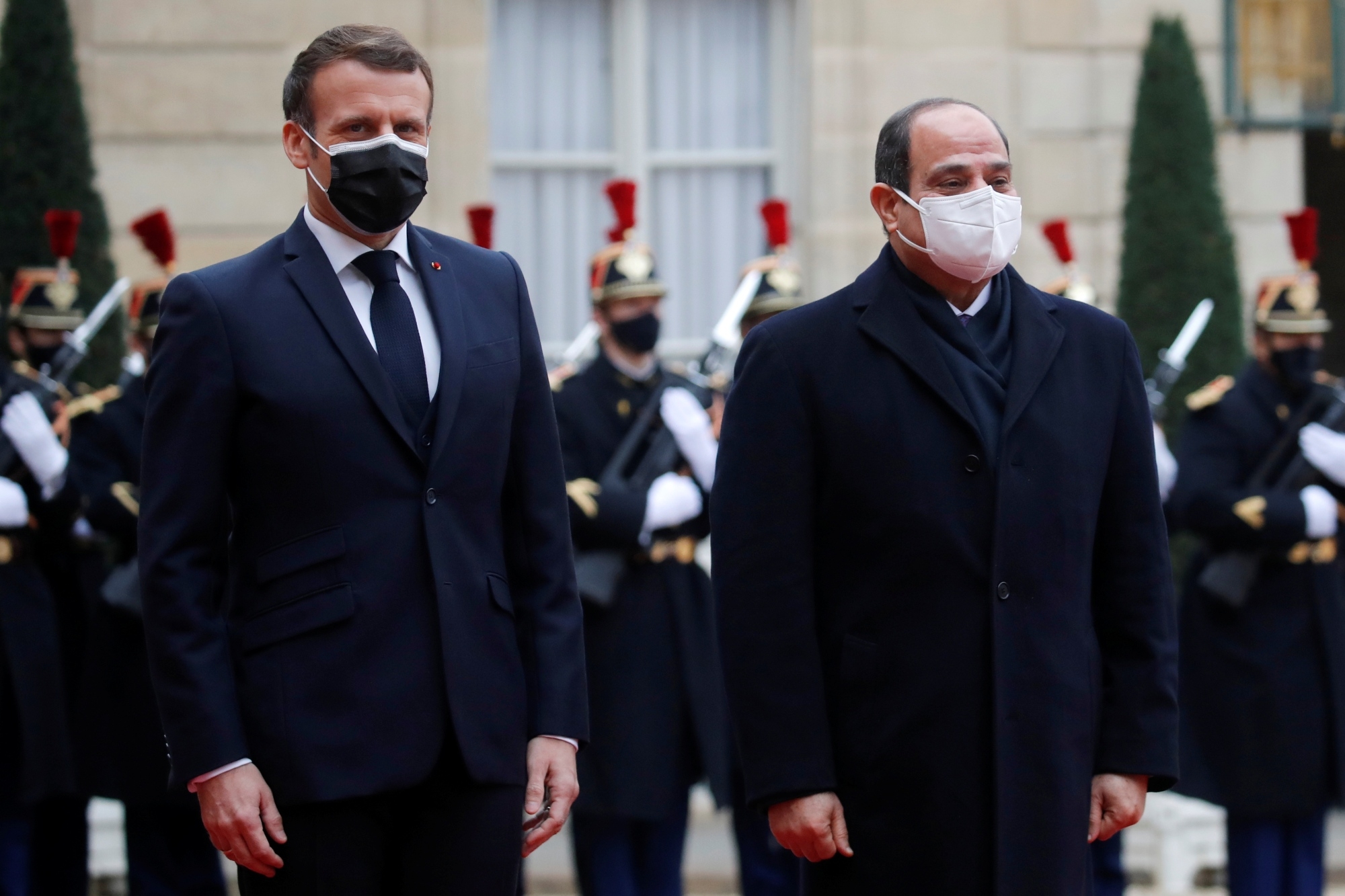
French President Emmanuel Macron said on Monday he would not condition the future sale of weapons to Egypt on human rights because he did not want to weaken Cairo's ability to counter terrorism in the region.
"I will not condition matters of defence and economic cooperation on these disagreements [over human rights]," Macron said during a joint press conference with President Abdel Fattah al-Sisi during the latter’s visit to Paris.
"It is more effective to have a policy of demanding dialogue than a boycott which would only reduce the effectiveness of one of our partners in the fight against terrorism," he added.
The French leader went on to say that Paris and Cairo were “united” in building “a space of civilisation” in which “there is no space for death threats and hateful discourse when freedoms are simply expressed” - in the wake of a call for a boycott of French goods in the Muslim world.
Macron has been criticised by human rights groups for inviting Sisi to France despite widely documented repression of political opposition, while the French government has itself come under fire for moving forward with draft legislation that has caused concern for rights advocates and the country’s Muslim community.
New MEE newsletter: Jerusalem Dispatch
Sign up to get the latest insights and analysis on Israel-Palestine, alongside Turkey Unpacked and other MEE newsletters
Military welcome
Earlier in the morning, Sisi was welcomed with a cavalry parade through the French capital. Drums rolled and trumpets blared as the French Republican Guard escorted him through the centre of the capital and across the Seine over the Pont des Invalides.
The Egyptian president is making a three-day visit to France, though hopes of nurturing closer ties were overshadowed by a furore over Cairo's rights record.
Under Sisi, Egypt has seen a widespread crackdown against human rights groups and independent media. Egyptian authorities are accused of detaining more than 60,000 political prisoners since Sisi ousted his democratically elected predecessor, Mohamed Morsi, in a 2013 military coup.
Those jailed in Egypt include Palestinian-Egyptian activist Ramy Shaath, husband of French national Celine Lebrun, held since July 2019 on accusations of acting against the state.
The French government in November criticised Egypt for the arrest of members of the Egyptian Initiative for Personal Rights (EIPR) after they briefed senior diplomats in Cairo and were met with a firm rebuke.
The three activists were released on Thursday following an international outcry, but the EIPR's assets have now been frozen by the Egyptian public prosecutor.
Executions in the country have also spiked this year, with dozens carried out after questionable trials in recent months.
Both states - which share concerns about instability across the Sahel, threats from Islamist groups in Egypt and the political vacuum in Libya - have cultivated closer economic and military ties under Sisi.
Between 2013 and 2017, France was the main weapons supplier to Egypt. Those contracts have now dried up, including deals for more Rafale fighter jets and warships that had been at an advanced stage. Diplomats say that is as much to do with financing issues as with France's response to human rights concerns.
Even within French officialdom there are doubts about the close embrace of Sisi. "I don't know what we gain from this visit. It's business as usual," one French diplomat told Reuters, deploring Macron's position.
Human rights criticism
Macron said he had spoken frankly to Sisi earlier in the day about matters of human rights in the North African country, although he gave few details.
He called himself the “constant advocate of democratic openness” and of “an active civil society”, Macron said he had brought up, “as one does between friends, with trust and frankness”, human rights issues, including the cases of the EIPR staff and Shaath.
But 17 French and international human rights groups issued a statement ahead of the visit accusing Macron of turning a blind eye to increasing violations of freedoms by Sisi's government.
"This tarnishes the image of France in the eyes of democracy in Egypt and the region, especially when Macron stands up against violence and extremism in France and then gives long statements about values," said Amr Magdi, a researcher at Human Rights Watch, one of the 17 groups that signed the joint statement. "But when he is tested in Egypt and the region, he sides with the oppressors and not the values he says he is defending."
French officials have dismissed the criticism, saying the government had a policy of avoiding public declarations about other countries' rights records and instead raises concerns in private.
"It is a partnership in favour of the stability of the region," the French official added.
The partnership came under strain in recent months after anger in Egypt and abroad over Macron's refusal to condemn caricatures depicting the Prophet Muhammad, considered blasphemous by Muslims, as well as his comments calling Islam "a religion in crisis".
But Macron thanked Sisi on Monday for his support following what he called a “campaign of hatred” against France.
Macron and Sisi are aligned in their opposition to the growing influence of Turkey in the Middle East and North Africa, as well as in their crackdowns on political Islam in their respective countries.
France is set to vote on Wednesday on legislation seeking to combat "separatism" in France, which rights groups have warned could indiscriminately target France's Muslim community. France has also experienced tense demonstrations in recent weeks over a bill that had a provision penalising the filming of police forces, as a number of instances of police violence have shocked the country.
Middle East Eye delivers independent and unrivalled coverage and analysis of the Middle East, North Africa and beyond. To learn more about republishing this content and the associated fees, please fill out this form. More about MEE can be found here.


